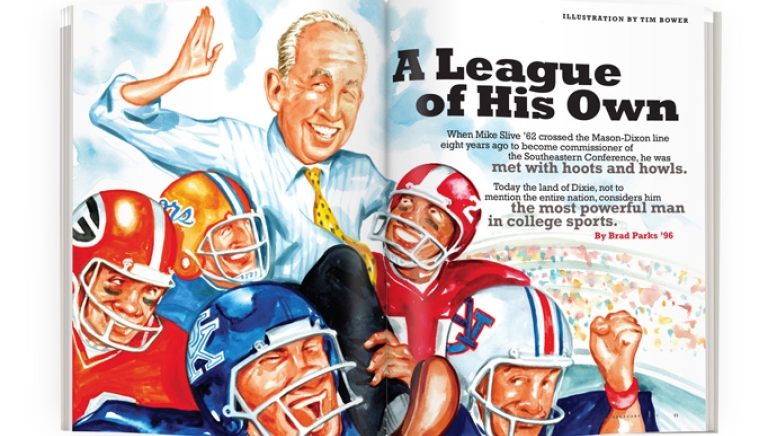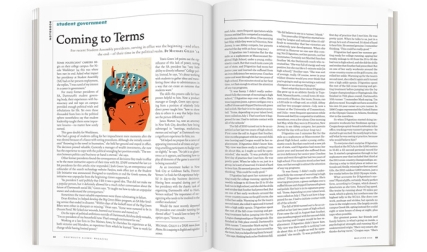From Tuscaloosa to Tallahassee, from Baton Rouge to Birmingham, the speculation had been broiling throughout the humid spring and into the muggy summer of 2002. The Southeastern Conference (SEC) was going through a search for a new commissioner. In an area of the country where college football fandom is cult-like, it was akin to ordaining a new high priest.
The safe money was on a longtime associate commissioner, who was said to have the backing of the league’s athletic directors. But there were also sexier names being floated: high-powered SEC alums with splashy resumes, former coaches who had led teams of yore, ex-athletes with instant name recognition.
When the conference’s choice was revealed—in the form of a short, cigar-chomping, Dartmouth-educated Jew from upstate New York named Mike Slive—the reaction was, to say the least, tepid. Slive, a former lawyer, had made his reputation in sports representing institutions accused of NCAA violations. He helped found Conference USA, one of those lesser leagues SEC schools visit only when padding their schedules.
His selection was viewed as a house-cleaning effort by the SEC, which then had six of its 12 schools either on probation or under investigation for serious NCAA infractions. Compared to some of the names being mentioned for the job, Slive was considered about as sexy as a mock turtleneck. The day after Slive’s introductory press conference the SEC’s sportswriters—who are sort of like the league’s Greek Chorus, only with more stains on their shirts—let him have it.
The Knoxville News-Sentinel called him “Judge Judy” and asked whether someone with such a “legalistic mind” was a good “fit” for the good ol’ boy SEC.
The Louisville Courier-Journal howled, “The man is as Southern as snow tires. He comes to Gridiron Central from a league that sits at the college football kids’ table.”
The Tennessean taunted, “Welcome to the SEC, Michael L. Slive…hope you brought your life jacket.”
The Birmingham News jeered, “Raise your hand if you believe one man has the power to clean up a league where the obscene monetary ends too often justify any means necessary. Now raise your hand if you believe Aubie and Big Al are real. (Aubie and Big Al are the mascots of Auburn and Alabama.)
“I was completely baffled,” says Paul Finebaum, a syndicated sports columnist for the Mobile Register. “An Ivy League intellectual from the Northeast coming into the heart of Dixie to be the commissioner of the SEC? I thought it was going to be a disaster.
“Boy,” Finebaum adds now, eight years later, “has he proven me wrong.”
The man who is today widely hailed as the most powerful administrator in college sports—a man who commands the leading conference in the land and has also served as the chairman of the Bowl Championship Series and the NCAA Men’s Basketball Committee—is the son of a butcher from Utica, New York. He practiced the old man’s trade himself as a part-time job in high school and college. And though today the white-haired 70-year-old runs a 25-person organization with a national profile—and more than $200 million in annual revenue—back then a good day ended with all his fingers intact.
A good-not-great quarterback at Utica Free Academy, he was recruited to play football at Dartmouth, though his career proved brief. As best Slive can remember, there were 23 quarterbacks but only 22 centers at the first practice. “When I lined up without a center,” Slive says, “I knew my days in football were numbered.” His time as a premed didn’t last much longer: a mere one semester of chemistry with professor John Wolfenden, who was legendary for ending medical careers before they began.
Yet even as a talent for quarterbacking and chemistry eluded Slive, he found his niche in other areas. He picked up lacrosse, a sport he had never played, and turned himself into a stalwart defensive-minded midfielder for coach Whitey Burnham, who later became a close friend. Slive also served as president of Alpha Theta, the Interfraternity Council and Palaeopitus.
“Mike was an incredible plugger who always found a way to make himself better at everything he did,” says John Walters ’62, a lacrosse teammate. “He was pretty quiet and unassuming about it, but he made an impression on everyone around him.”
After Dartmouth Slive went straight to law school at the University of Virginia. But he discovered during a yearlong fellowship at Georgetown that the law didn’t feel like a calling. Thus began a peripatetic existence during which he and his wife, Liz—later joined by daughter Anna—crossed the country following a career that, even in retrospect, seems like anything but a straight line to where he sits today.
The first stop was back in Hanover, where Slive worked in Dartmouth’s financial aid office. A year later, in 1968, athletic director Seaver Peters ’54 had an opening for an assistant, and Slive—who had become a regular at all the sporting events—jumped at it.
“In those days we didn’t have a facilities manager, compliance people, scheduling people,” says Peters. “It was really a two-person operation. So we worked very closely together. It was obvious from the start he was a real talent.”
After two years of stuffing ticket envelopes Slive felt he was wasting his legal training and became an associate at Stebbins & Bradley in Hanover. That started two decades of yo-yoing between sports and law. Because while Slive began rising in the legal community—he became judge of the Hanover District Court and then judicial master of Grafton County Superior Court—sports kept grabbing at him. And Dartmouth kept playing a part.
The first time was when football coach Jake Crouthamel ’60 arranged for Slive to act as an agent to Reggie Williams ’76. An All-America linebacker, Williams was torn between the CFL’s Toronto Argonauts, who were offering him a $100,000 signing bonus, and the NFL’s Cincinnati Bengals, who were offering a $35,000 rookie contract.
“Mike is the first one to tell you: When you have an emotional decision, use logic,” says Williams, who played 14 seasons with the Bengals. “He knew my passion was in proving I could make it in the NFL, and he didn’t let me lose sight of that.”
The second time came a decade later. After stints as assistant commissioner of the Pac-10 Conference in California, where he was in charge of NCAA compliance issues, and at Cornell, where he was athletic director, Slive returned to Hanover and hung out his own shingle as a lawyer. In 1986 he was retained by Joe Yukica, who felt he had been unfairly terminated as Dartmouth’s football coach.
“It wasn’t easy for him, being an alum and a former college employee, to go against his school,” Yukica says. “But he took it because he thought it was the right thing to do.”
Slive, along with seasoned trial lawyer David Nixon, successfully argued that firing Yukica with one year left on his contract would irreparably harm his career. Dartmouth was forced to reinstate Yukica. But the victory was not without cost to Slive. “I got some hate mail,” he says. “I also remember a headline in the Valley News that said something like, ‘Mike Slive: His friends swear by him, his enemies swear at him.’ ”
Still, the precedent-setting case gave Slive a national reputation in sports law. And when a pair of Midwest universities were accused of NCAA violations, they hired Slive, who soon realized there could be a practice in helping wayward schools go straight. He relocated to Chicago and, along with partner Mike Glazier, soon had all the work he could handle. He loved it.
“Mike’s idea of a great Saturday morning was to meet early for breakfast at a place called Lou Mitchell’s in Chicago—and I’m talking 6 o’clock in the morning,” recalls Glazier. “He’d be wearing his cowboy boots and his jeans, because he didn’t have to wear a suit. And then he’d spend most of the rest of the day dictating.”
A close relationship with several institutions led to Slive’s role in creating the Great Midwest Conference and its predecessor, Conference USA, of which Slive was the first commissioner. And that’s what he was doing when, unexpectedly, the SEC came calling in 2002.
Slive says that when he was installed in the SEC’s Birmingham, Alabama, offices, he wasn’t given any kind of directive to become the new sheriff in town. But it soon became clear, with a style that was both personable and relentlessly direct, that’s what he was going to be.
“I felt that no matter how successful the league was we would not be viewed as successful if we had compliance issues,” says Slive. “We’re talking about athletics here, but you always have to keep in mind this is higher education. If you lose that, you’ve lost your soul.”
Slive formed a task force to address the systemic rule-breaking and in 2003 announced the goal of having every SEC school infraction-free in five years. His statement was met with howls of incredulous laughter from around the American South, including the SEC’s ever-skeptical sportswriters. And yet the task force, whose recommendations were unanimously ratified in 2004, slowly began to change the league in culture and practice.
“When he took over we had these bitter feuds going on between some of the schools that were ratting each other out to the NCAA every chance they got. It was pure Hatfield-and-McCoy stuff,” says Gene Marsh, a University of Alabama Law School professor who wrote the task force’s report. “There was a strong feeling before Mike came in that if you brought a complaint to the SEC office, it would go there and die. Mike established that if you brought a complaint, it would be seriously addressed. So everyone doesn’t just run off to the NCAA the first time they hear a rumor.”
By 2008 the only SEC program on NCAA probation was Arkansas track and field. As of October of this year there was only one SEC school serving time: Alabama, for a relatively minor scandal involving student athletes receiving free textbooks.
“Mike has really influenced the SEC to aspire to its better angels,” says Princeton athletic director Gary Walters, who was Dartmouth’s freshman basketball coach in 1968 when he first met Slive. “I think the [SEC] presidents recognized some of the shenanigans that were going on were really tarnishing the educational reputations of their schools. And they couldn’t have hired a better person to help correct that.”
What’s more, the SEC is more financially successful than ever. Thanks to contracts Slive negotiated with ESPN and CBS, SEC schools received on average $17.4 million from the conference last year. The league has also won four straight national championships in football.
“He has just been a phenomenal commissioner in every respect,” says University of Kentucky president Lee Todd. “He’s got the presidents totally unified behind him.”
There have also been other victories, such as Mississippi State making Sylvester Croom the first African-American head football coach in SEC history in 2003. John Walters remembers visiting his old classmate at a hotel suite in Atlanta when the news broke and finding Slive with newspapers spread across a bed.
“He was reading those newspaper articles with tears in his eyes,” said Walters, one of a number of Dartmouth connections Slive has kept strong through the years. “He had really pushed for that, and he was so proud.”
Slive’s current contract, which pays him a little more than $2 million a year in base salary and bonuses, runs through 2012, and he talks like a man who wouldn’t mind signing on for one more go. He’s so eager to get to work each morning, he sets his alarm clock for 4:45 a.m. He does not golf or garden. If he has a hobby, it’s wandering out on the back porch of his Birmingham home with a book on a Sunday afternoon, lighting a cigar and looking at the view.
“Sometimes I sit back and I don’t believe it,” says Slive. “I came from Utica, New York. My folks didn’t go to college. And somehow, here I am. There isn’t another job I’d rather have. And there’s no place where I’d rather be.”
Brad Parks is a frequent contributor to DAM. His most recent story, which appeared in the March/April 2010 issue, was about the 1958-59 hockey team. His next book, Eyes of the Innocent, will be published by St. Martin’s Press in February.




